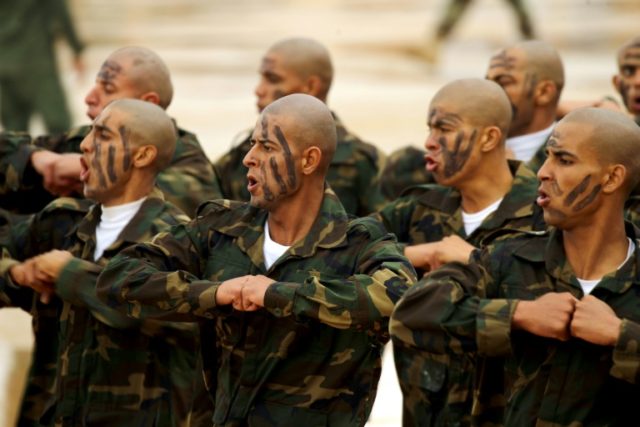A private security company affiliated with the Russian military intelligence has been backing strongman Gen. Khalifa Haftar from Libya’s breakaway government with 300 mercenaries and has supplied his Libyan National Army (LNA) accused of war crimes with artillery, tanks, drones, and ammunition, the Telegraph recently found.
Russia’s support came as the general and his LNA forces consolidated their control of large swathes of territory in the eastern and southern part of Libya. Early last month, the U.S. military cautioned about the presence of “oligarch-funded, quasi-mercenary” Russian “military advisors” in Africa.
On Sunday, the Telegraph confirmed:
The murky private military company Wagner Group has been supporting Khalifa Haftar with 300 personnel in Benghazi and has supplied his Libyan National Army with artillery, tanks, drones and ammunition, a Whitehall source said.
…
The Russian defense ministry did not respond to requests for comment. …The news of Wagner’s involvement in Libya corresponds with Russia’s push to increase influence in Africa through an arsenal ranging from arms and energy deals to covert military and political support.
With the help of Russia and other countries, including neighboring Egypt and the United Arab Emirates (UAE), Gen. Haftar has conquered most of eastern and southern Libya, including the largest oil field in the country.
A source close to the Libyan Russian Oil & Gas Joint Company told the Telegraph in April that “lots of Wagner fighters went [to Libya], and there are rumors that military personnel also went there”.
“They are trying to secure the deep-water ports of Tobruk and Derna for the Russian Fleet” and also “could control the flow of oil to southern Europe” if they take over Libya’s energy industry, the source reportedly added.
The LNA has defeated jihadist groups and allegedly committed war crimes against civilians as it advanced across eastern and southern Libya.
As the main leader of the Tobruk-based breakaway government in eastern Libya, Gen. Haftar is the top rival of the internationally recognized administration in Tripoli led by Prime Minister Fayez al-Sarraj from the United Nations-brokered Government of National Accord (GNA).
Haftar and PM Sarraj agreed to hold elections last Thursday, without setting a specific date for the vote.
Over the weekend, Gen. Haftar’s LNA declared that it had captured Libya’s southern border with Algeria, claiming they now control all of the North African country’s borders except one to the west that lies along Tunisia’s international boundary, the Libyan Express reported.
The U.S. military has expressed concerns about Russia’s activities in Libya, which has descended into chaos since the NATO-backed overthrow of dictator Muammar Qaddafi in 2011, ultimately becoming a fertile ground for the likes of the Islamic State (ISIS/ISIL) and al-Qaeda.
Anna Borshchevskaya, an expert on Russian foreign policy at the Washington Institute for Near East Policy, warned U.S. lawmakers in 2017:
Moscow’s foothold in Libya is growing. This issue is important to watch in the months ahead. Putin increasingly supports Libya’s Gen. Khalifa Haftar, who controls the oil-rich eastern part of the country but wants more.
Libya’s turmoil led to the formation of the two rival governments — one in Tobruk led by Haftar and the internationally recognized one Tripoli.
Haftar served under Gaddafi before going into exile in the United States after falling out of the dictator’s favor. Some news outlets have crowned Haftar the “New Qaddafi.”

COMMENTS
Please let us know if you're having issues with commenting.